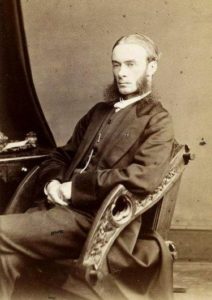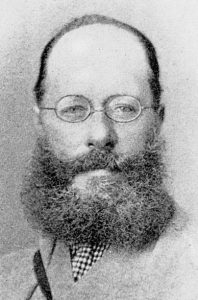
Neither a firm of county-town solicitors, nor nonsense to soon find a link between Theodore Bent and Edward Lear (1812-1888). The Oxford academic and traveller to the Eastern Med, Henry Fanshawe Tozer (1829-1916) – himself somewhat Learesque – visited the artist, a lover of Greece, but by then too infirm to travel, in his San Remo villa in 1885, and sent him a copy of Bent’s newly published and seminal work: The Cyclades or Life Among the Insular Greeks (London, 1885).
In the 9 May 1885 issue (no. 679, pp 322-3) of The Academy, Tozer submitted a full and waspish review of Bent’s now-famous book. The review is a great read, something of a series of fierce island landscapes of its own, in all seasons. He lets rip, but ends charitably, in a manner fitting for a man of the cloth: “But this does not much detract from the usefulness of the book as a unique description of the life and ideas of a people, which renders it a very storehouse of facts for the student of customs and myths. And in this respect its value will be permanent. Other travellers may follow in Mr. Bent’s footsteps [millions in fact], and fill up what is wanting in his archaeological information; but in a few years’ time, if any traveller be found so enduring as to attempt once more the task which he has so well performed, it is highly probable that a great part of these interesting customs and ideas will have disappeared.” Very true, and now the islands are an ordeal in summer for any but teenagers – some of the blame can be lain at Bent’s door perhaps. Incidentally, Tozer’s 1890 book The Islands of the Aegean has been long forgotten.

Lear is soon writing to his friend Chichester Fortescue: ‘Tozer of Oxford sends me a charming book…by Theodore Bent…all about the Cyclades. (Dearly beloved child let me announce to you that this word is pronounced ‘Sick Ladies,’ – howsomdever certain Britishers call it ‘Sigh-claides.’)…’ (Lear to Chichester Fortescue, Lord Carlingford [30 April 1885, San Remo]).
Lear, like Bent, struggled with the tug between sunshine and showers:
“It seems to me that I have to choose between two extremes of affection for nature – towards outward nature that is – English or southern – the former, oak, ash and beech, downs and cliffs, old associations, friends near at hand, and many comforts not to be got elsewhere. The latter olive – vine – flowers, the ancient life of Greece, warmth and light, better health, greater novelty, and less expense in life. On the other side are in England cold, damp and illness, constant hurry and bustle, cessation from all topographic interest, extreme expenses…” [Edward Lear, c. 1860, taken from a letter, in Edward Lear: A Biography by Peter Levi (1995, p. 192)]
 Leave a comment or contact us about this article
Leave a comment or contact us about this article